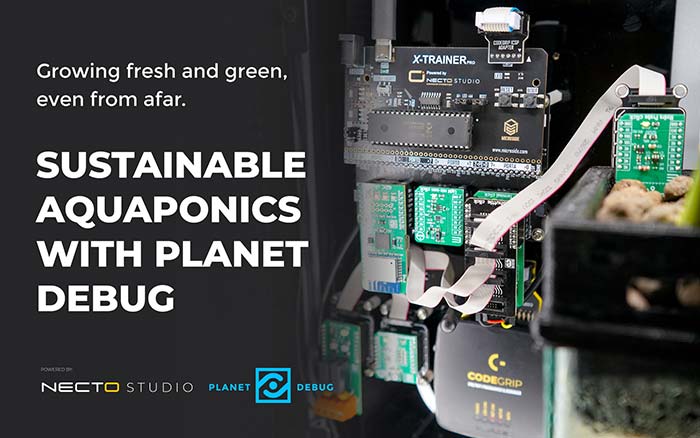 MikroElektronika (MIKROE), the embedded solutions company that dramatically cuts development time by providing innovative hardware and software products based on proven standards, has announced that Microside, the product development, manufacturing and training company based in Mexico and a partner of MIKROE, has developed a full aquaponics system based on MIKROE’s Click™ boards using MIKROE’s remote design and debug platform, Planet Debug™.
MikroElektronika (MIKROE), the embedded solutions company that dramatically cuts development time by providing innovative hardware and software products based on proven standards, has announced that Microside, the product development, manufacturing and training company based in Mexico and a partner of MIKROE, has developed a full aquaponics system based on MIKROE’s Click™ boards using MIKROE’s remote design and debug platform, Planet Debug™.
The project aimed to demonstrate the practical application of the MIKROE toolchain at the IoT Day Guadalajara 2023 event. Initially, Microside’s goal was to monitor temperature and humidity using its X-TRAINER PRO development board, powered by MIKROE’s integrated development environment, NECTO™, and Click boards, then display this data on Click Cloud. However, the company soon realized that it would be possible to create a full aquaponics system, monitoring and controlling a wider range of variables that would have more impact.
Microside selected the following Click boards for the aquaponics system:
Environment Click™ – measures the ambient temperature & humidity.
Light mix-sense Click™ – measures the ambient light.
Hydro Probe Click™ – measures the floor humidity.
Relay Click™ – controls the water pump when certain conditions are met.
Shuttle Click™ and mikroBUS shuttle™ – increases the number of mikroBUS sockets available on the MIKROE development board.
Terminal Click™ – exposes an analogue pin, 3.3V pin, and GND pin, enabling an LM35 waterproof probe temperature sensor to measure the water temperature.
G2C Click™ – connects to Click Cloud IoT service.
From this, Microside was able to create a full aquaponics ecosystem that remotely monitors ambient temperature and humidity, ambient light, water temperature, crop floor humidity, and also an automated pump control for continuous water flow.
The MCU specified for the design was Microchip’s PIC18F47K42, which is compatible with MIKROE’s mikroSDK software development kit that allows code portability and speeds development. The whole system runs through the NECTO IDE, and programming and debugging was done remotely over Wi-Fi, using Planet Debug, MIKROE’s remote development platform.
Comments Nebojsa Matic, CEO of MIKROE: “This project is a great example of how a small team can create a complex system in a very short time using our full range of low cost embedded development tools.”
Full details of the aquaponics project, including a video demo can be found here.


